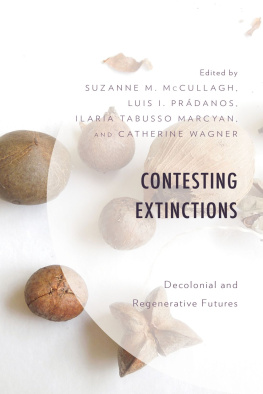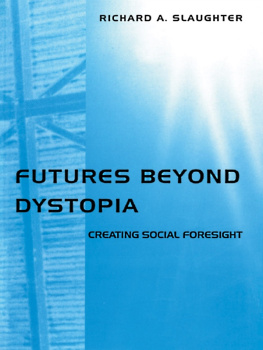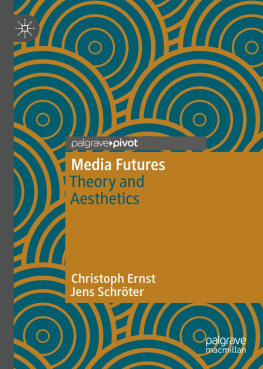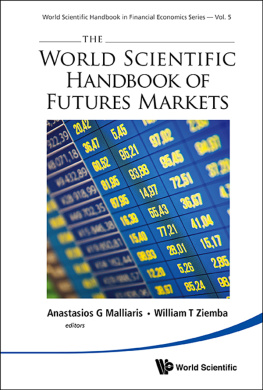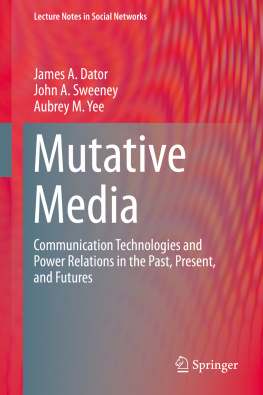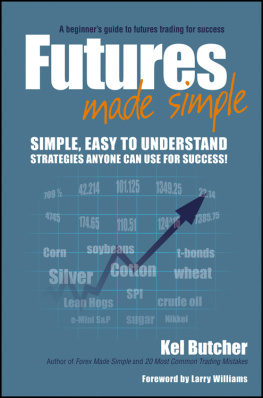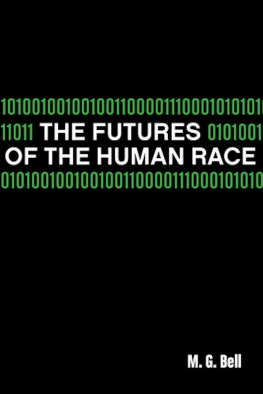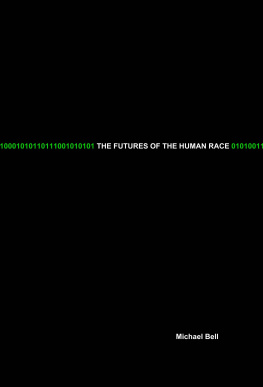Originally published in 1997 by Transaction Publishers
Published 2017 by Routledge
2 Park Square, Milton Park, Abingdon, Oxon OX14 4RN
711 Third Avenue, New York, NY 10017, USA
Routledge is an imprint of the Taylor & Francis Group, an informa business
Copyright 2003 by Taylor & Francis.
All rights reserved. No part of this book may be reprinted or reproduced or utilised in any form or by any electronic, mechanical, or other means, now known or hereafter invented, including photocopying and recording, or in any information storage or retrieval system, without permission in writing from the publishers.
Notice:
Product or corporate names may be trademarks or registered trademarks, and are used only for identification and explanation without intent to infringe.
Library of Congress Catalog Number: 00-051207
Library of Congress Cataloging-in-Publication Data
Bell, Wendell.
Foundations of future studies / Wendell Bell ; with a new preface by the author.
p. cm.
Includes bibliographical references and index.
Contents: v. 1. Human Science for a New Era.
ISBN 0-7658-0539-1 (v. 1 : pbk. : alk. paper)
1. ForecastingStudy and teaching. 2. Civilization, Modern1950ForecastingMethodology. 3. Social sciencesStudy and teaching. I. Title.
CB158.B45 2000
303.490905dc21
00-051207
ISBN-13: 978-0-7658-0539-3 (pbk)
For my wife Lora-Lee,
whose art enriches me,
whose friendship I cherish, and
whose love I will return, always.
I wrote the first words of this book in Canberra, Australia in January, 1985, more than ten years ago. Although I take full responsibility for what I have written, this book is primarily a work of synthesis of other peoples work. It could not be otherwise in an attempt to describe an entire field of inquiry. To organize and structure modern futures studies I rely on the many futurists who have provided its foundations and continue to contribute to it.
I believe that to provide a synthetic overview of a specified field is an important task that is too seldom carried out. Such an overview is of particular importance to subject matters that are both relatively new and fragmented, such as futures studies is. Moreover, it is an antidote to the infoglut that now threatens to engulf us, and, indeed, it can give the structure and meanings without which information cannot be called knowledge. But very little in this book is based on any original research of mine. I herewith acknowledge my enormous debt to the hundreds of authors whose works are the basis of what I have written here.
Most such authors are acknowledged by being listed in the references given at the end of this book. Some may not be so acknowledged simply because I read something of theirs, heard them speak, or heard someone speak about them and tucked away some bit of information in my mind without remembering the source. If I use anyones work and fail to cite it, I apologize. It is not a deliberate oversight, because I wish to acknowledge in full my intellectual debts.
Many people played a role in helping me write this book. Among the most important is Frank L. Jones who arranged for a Visiting Fellowship for me at the Institute of Advanced Studies, Australian National University in 1985. It was there that I was able to devote my full attention to this book for the first time and to write its beginning chapters. He and his colleaguesand their spousesnot only were gracious hosts, introducing my wife and me to the many wonders of Australia, but also gave me encouragement and constructive criticism as I struggled with some ideas that were then less than half-formed.
Over the years many of my (sometime) colleagues at Yale gave me the benefit of their critical judgments, suggestions for improvement, and expertise. They include Neil Bennett, Steven Brint, Michele Dillon, Paul J. DiMaggio, Leonard Doob, Kai T. Erikson, Robert E. Lane and his wife Helen (the novelist Helen Hudson), Wayne A. Meeks, Jonathan Reider, Albert J. Reiss, Jr., Lloyd H. Rogler, Ian Shapiro, Steven B. Smith, John J. Stanfield II, and Peter C. Yeager. I thank each for his or her generosity and friendly collegiality.
At Yale, I taught a course on social change and the future, under one title or another, from the late 1960s until the mid-1990s. Some of the ideas in this book come from discussions with both undergraduate and graduate students. In recent years, my students read some of the drafts of this book, and their comments were useful as I revised the manuscript. Although it is impossible to recognize them all by name here, I am happy to acknowledge their assistance. Former Yale graduate students who made significant contributions to my thinking about futures studies include Steven F. Alger, Menno Boldt, Bettina J. Huber, and Jeffrey K. Olick.
I am also indebted to the UCLA graduate students who worked with me in the Caribbean in the early 1960s where my interest in futures studies began. I especially wish to acknowledge the contributions of Anthony P. Maingot, James A. Mau, Charles C. Moskos, and Ivar Oxaal.
Other scholars and scientists have given kindly of their time and thought as they responded to various parts of this book. I particularly thank biologist Peter Bellinger, philosopher Keekok Lee, political scientist Richard C. Snyder, and my college professor of English literature, the late Earl Lyon, who did what he could throughout most of his life to improve my writing. I thank, too, another former professor and mentor, sociologist Leonard Broom, whose standards both of professional excellence and social justice have been a life-long inspiration to me.
In the last few years particularly, more and more of my intellectual peer group has been composed of futurists. They have been most generous in giving me their support and help on this book, even though in some cases it competes with their own projects and in nearly all cases intrudes onto their intellectual turf. I wish to thank especially futurists Joseph F. Coates, Howard F. Didsbury, Jr., Theodore J. Gordon, Bernd Hamm, Richard L. Henshel, Michael Marien, Eleonora B. Masini, Max Singer, Richard A. Slaughter, Bart van Steenbergen, Lorne Tepperman, and Robert B. Textor.
Four other futurists served as official reviewers of my manuscript and took an extraordinary amount of time from their own busy schedules to read and comment on it at length. Moreover, each has made additional personal contributions to my education as a futurist over many years for which I am grateful. They are James A. Dator, Gary Gappert, Reed D. Riner, and Allen Tough. Although I was not able to follow all of them, their editorial suggestions have made this a better book than it would have been otherwise.
No manuscript ever gets off to a publisher without logistic support. This manuscript is no exception. The staff of the Yale University Department of Sociology most ably provided much of the managerial and secretarial assistance needed to complete this book. I thank Pamela B. Colesworthy, business manager, Ann Fitzpatrick, senior administrative assistant, and, particularly, Nancy Hopkins, registrar, who served as my administrative and secretarial assistant through many drafts of this book from the first to the last page.


